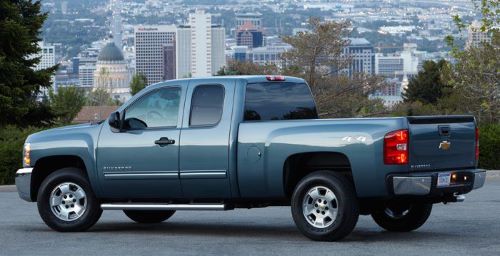
For years, General Motors' Chevy pickup trucks played runner-up to America's favorite, the Ford F-Series. But in the 2000's, the Silverado, Avalanche, and Colorado carved out a solid position in this marketplace with improved sales thanks to a versatile and appealing lineup.
And in today's car market, with its extremely high prices, many buyers are looking at older vehicles that may have aged well as a way of saving significant dollars. And by "older", I am generally referring to 10+ year-old vehicles.
And clearly, prospective buyers must weigh the benefits of affordability and performance against potential drawbacks, such as higher maintenance needs and unexpected repairs.
So here, ...
1. We'll look at what history has proven about the reliability of older Chevy trucks, including the Avalanche, Silverado, and Colorado.
2. Then we'll list the specific mechanical problems of each so they can be checked before buying one today.
But first, two very important suggestions ...
1. Things To Do When Considering An "Older" Chevy Truck:
Locate Lower Mileage Vehicles: They are certainly out there to be found with careful and patient shopping. Be willing to drive a distance if you have to.
Vehicle History and Maintenance: Ask for the vehicle history report (CarFax or AutoCheck) as well as documented maintenance and repair records. If not provided by the dealer or private seller, it's best to move on.
Pre-Purchase Inspection: Have the vehicle independently inspected before making a final decision. This usually will cost in the $150-$200 range but is well worth it given the potentially thousands in savings over the long term.
2. Know How To Get The Best Price:
Get Dealers To Compete For your Business: When you are searching vehicles to possibly purchase, the following is the absolute best way to get the lowest price, and it is extremely easy and stress-free.
Just go to a national car listing site, (I happen to prefer CarsDirect.com for their massive dealer participation and ease of use, although others will get the job done as well) and find several listed vehicles that you may be interested in.
Then write something like the following in the "Check Availability" box or "Contact Dealer" box or whatever the site you are using uses.
"Hello, I've contacted several dealers about cars I am interested in and am looking for the best value. I am also a serious buyer planning to make a decision soon. Please send me your best out-the-door price. Thank you.
After receiving the offers, follow up by explaining that based on the price, you're leaning in another direction but still really like their car and would certainly consider another offer. When dealers drop out, you'll know you're at the best price.
Using the internet to get dealers to compete for your business is extremely important. More details on this and how to intereact with the dealers can be found here at Best Used Car Buying Techniques.
Older Chevy Truck Reliability
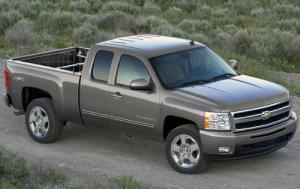
Chevrolet trucks, particularly those over a decade old, have garnered a reputation for their durability and longevity, making them popular choices for both work and leisure. When assessing the reliability of these older models, several key factors come into play, including their build quality, maintenance history, and common issues.
Build Quality and Design
Chevrolet trucks from the mid-2000s to early 2010s, like the Silverado 1500, are often praised for their robust construction and solid engineering. They were designed to handle demanding tasks, from towing heavy loads to off-road driving. The use of durable materials in their chassis and body panels contributes to their long-lasting nature.
Engine and Drivetrain
The engines in these trucks, such as the Vortec V8, are well-regarded for their performance and reliability. Many owners report high mileage without significant issues, provided that the engine is well-maintained.
The transmission systems, while generally reliable, can sometimes require attention, particularly around the 150,000 to 200,000-mile mark.
Common Issues
While Chevrolet trucks are known for their durability, there are some common issues that owners might encounter as these vehicles age:
Rust: One of the most prevalent problems in older trucks is rust, particularly in regions with harsh winters where salt is used on roads. Rust can affect the body panels, frame, and undercarriage.
Electrical Problems: Older Chevy trucks can experience electrical issues, such as failing sensors, faulty wiring, and problems with the instrument cluster. These can often be addressed with repairs or replacements.
Suspension and Steering: Components like ball joints, tie rods, and bushings can wear out over time, leading to a need for replacement to maintain proper handling and ride comfort.
Transmission Issues: As with many older vehicles, the transmission can develop problems, such as slipping or hard shifting. Regular maintenance and fluid changes can help mitigate these issues.
Maintenance History
The reliability of a 10+ year old Chevy truck is heavily influenced by its maintenance history. Trucks that have received regular servicing, including oil changes, brake checks, and timely repairs, are more likely to remain reliable over the long term.
And these are the vehicles shoppers should be identifying today. Neglecting maintenance can accelerate wear and tear, leading to more significant problems down the line.
Community and Support
One advantage of owning an older Chevrolet truck is the extensive community and aftermarket support. There are numerous forums, clubs, and online resources where owners share tips, advice, and solutions for common problems. Additionally, the availability of aftermarket parts makes it easier and often more affordable to keep these trucks running smoothly.
Conclusion
Overall, 10+ year old Chevrolet trucks are generally reliable vehicles, especially when they have been well-maintained. They offer a combination of strong build quality, powerful engines, and a supportive community of owners.
History has proven that well-maintained older Chevrolet trucks can last a significant amount of time and mileage. With proper care, these vehicles can often reach and exceed 200,000 to 300,000 miles.
However, potential buyers should be mindful of the more common issues listed below and ensure thorough inspections and maintenance to maximize their longevity and reliability.
Chevy Avalanche
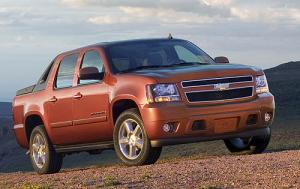
The Chevy Avalanche, for example, is notable for its sleek design, powerful V8 engines, and strong towing ability while still providing quiet and comfortable daily driving.
A good potential candidate now would be the one redesigned for the 2007 model year and produced through 2013 (its last generation), Chevy's reconfigurable truck was given more power and additional features.
The Avalanche is basically a Chevy Suburban with a crew-cab and a folding midgate that separates the cab from the cargo bed. Lowering the midgate extends the bed from 5.3-feet to 8.2-feet. It's top competitors include conventional full-size pickups such as the Dodge Ram 1500, Ford F-150, and Toyota Tundra.
Possible Older Chevy Avalanche Mechanical Problems
The last Avalanche generation had a number of mechanical issues reported by some owners. Of course, not all vehicles had these problems, but they should still be included an a pre-purchase inspection today:
Active Fuel Management (AFM) Issues: The AFM system, designed to improve fuel efficiency by shutting down cylinders, sometimes led to excessive oil consumption. This issue manifests as increased oil consumption, fouled spark plugs, and potential engine misfires.
Timing Chain Wear: Timing chain stretch or wear was a notable issue, particularly in higher mileage vehicles. Symptoms include the check engine light illuminating, rough running engine, and misfires.
Throttle Body Problems: A faulty throttle body can cause rough idling or stalling. This issue presents itself with engine stalling, rough idle, and reduced acceleration.
Transmission Issues: The 6-speed automatic transmission could develop problems such as hard shifting, slipping, and failure. Owners reported harsh or delayed shifts, slipping out of gear, and transmission overheating.
You May Also Like:
How To Get The Lowest Rate Car Loan
Instrument Cluster Failure: The instrument cluster stepper motors and gauges may malfunction. Symptoms of this issue include inaccurate or non-functional gauges.
Steering and Suspension: Some models experienced a clunking noise in the steering column, usually caused by the intermediate steering shaft. In addition, some owners reported premature wear of ball joints, affecting alignment and tire wear.
ABS Sensor Issues: Some owners reported that faulty ABS sensors led to the ABS warning light being on and, in some cases, a potential loss of ABS functionality.
Brake Line Corrosion: Corroded brake lines were reported by some owners, especially in regions with road salt use. Symptoms include brake fluid leaks and reduced braking performance.
Fuel Pump Failure: Reports of fuel pump failure were more common, leading to engine starting issues. Symptoms include difficulty starting, engine stalling, and loss of power.
Exhaust Manifold Cracks: Cracks in the exhaust manifold were reported. This problem is characterized by a ticking noise from the engine area and exhaust leaks.
Transfer Case Problems: Transfer case encoder motor failure occurred in some 4WD models, causing an inability to shift into or out of 4WD.
Air Suspension Problems: Some vehicles equipped with air suspension could experience air leaks or compressor failure.
Chevy Silverado
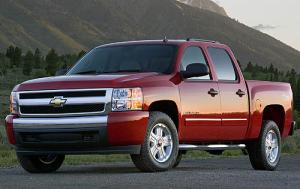
The Chevy Silverado has very roomy extended and crew cab models, strong engines, decent gas mileage, and also a hybrid model. Chevrolet also redesigned its half-ton pickup truck for 2007, giving them a new look, more power, and additional features. This second generation version was produced through 2014.
This Silverado was made 3-inches longer and 1.5-inches wider, while the wheelbase remained the same. Regular, extended, and crew-cab body styles were continued.
The extended-cab's rear-hinged back doors do not open independently of the front doors, but open wider than earlier models. Extended and crew cab models include a three-passenger rear bench seat and a choice of front bucket seats or a bench. The regular cab models come only with the three-passenger front bench.
Possible Older Chevy Silverado Mechanical Problems
The second generation Silverado had a number of more common mechanical issues reported by owners. Again, these were far from universal, but should be included in an inspection before buying one today:
Fuel System Failures: Fuel pump failures were reported by some owners, requiring costly repairs due to the need to drop the fuel tank.
Active Fuel Management (AFM) Issues: As with the Avalanche, the AFM system, designed to improve fuel efficiency by shutting down cylinders, could sometimes cause excessive oil consumption, dirty spark plugs, and possible engine misfires.
Steering and Suspension: Clunking noise in the steering column, often caused by the intermediate steering shaft. Some owners also reported premature wear of ball joints, affecting alignment and tire wear.
Throttle Body Problems: Faulty throttle bodies caused rough idling, reduced acceleration, or stalling in some models.
ABS Module Failures: Issues with the ABS module and wheel speed sensors were reported by some owners, causing ABS warning lights and potential loss of ABS functionality.

Transmission Issues: The 4L60E and 6L80 transmissions in some models experienced problems such as harsh or delayed shifts, slipping out of gear, and transmission overheating.
Instrument Cluster Failure: Instrument cluster stepper motors and gauges were reported to malfunction by some owners.
Steering and Suspension: Clunking noise in the steering column, often caused by the intermediate steering shaft. Some owners also reported premature wear of ball joints, affecting alignment and tire wear.
Radiator Leaks: Some owners reported radiator leaks and coolant loss, potentially leading to overheating.
Brake Line Corrosion: Particularly in regions with harsh winters, brake line corrosion was a reported problem, leading to brake fluid leaks and potential brake failure.
Blower Motor Resistor: Some owners reported failures in the blower motor resistor causing the HVAC fan to stop working on some speed settings.
Evaporative Emission Control (EVAP) System Problems: Faults in the EVAP system were reported, including issues with the purge valve and vent valve, causing check engine lights and emissions-related problems.
Exhaust Manifold Cracks: Some owners reported cracks in the exhaust manifold characterized by a ticking noise from the engine area and exhaust leaks.
Chevy Colorado
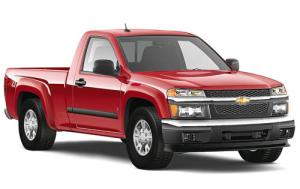
And replacing the S10, the Chevy Colorado was one of the biggest, boldest and most refined compact trucks available, with excellent on and off-road handling, simple controls, and side curtain airbags on all body styles.
The first generation Colorado was produced from 2004 - 2012 (it then took a hiatus until the 2015 model) and included regular, extended, and crew cab versions.
A big transformation took place in the engines with a 175 horsepower 2.8-liter replacing the 120 horsepower 2.2-liter four-cylinder base engine. A 220 horsepower 3.5-liter inline five-cylinder (the Z71 package) also replaced the S10's earlier 190 horsepower 4.3-liter V6.
Both engines have dual overhead cams versus overhead valves and come with either a manual transmission or four-speed automatic. And both are available with rear-wheel drive or four-wheel drive with low-range gearing (must disengage on dry pavement).
Possible Older Chevy Colorado Mechanical Problems
The first generation Chevrolet Colorado, produced from 2004 to 2012, had a number of somewhat more common mechanical problems that prospective buyers should be aware of and check for prior to purchase:
Timing Chain Issues: Some owners reported that models with the inline 5-cylinder (3.5L and 3.7L) engines experienced timing chain tensioner failures. This problem manifests as a rattling noise from the engine, especially at startup or under acceleration, and potential engine performance issues.
Cylinder Head Problems: Some models, especially those with the 3.5L inline-5 engine, experienced cylinder head failures due to cracks. Symptoms included misfiring, loss of power, check engine light, and coolant loss.
Electrical Issues: Electrical system problems, including faulty wiring and issues with the instrument cluster, were reported by some owners.
HVAC Blower Motor Resistor Failure: The HVAC blower motor resistor failed on some vehicles, leading to issues with the heater and air conditioning fan speeds.
Transmission Problems: Some models with automatic transmissions developed issues such as noticeable delay or roughness when shifting gears and the transmission slipping out of gear.
Suspension and Steering Issues: Wear and tear on suspension components like ball joints, control arms, and tie rods have been reported. Symptoms include clunking noises, poor handling, and uneven tire wear.
Fuel System Issues: Faulty fuel level sensors were reported by some owners, leading to inaccurate fuel gauge readings.
Rust and Corrosion: Rust, particularly in regions with harsh winters and road salt use, affecting the frame and body panels, was reported by some owners.
 By Josh Rosenberg
By Josh Rosenberg